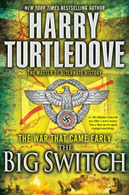The War that Came Early: The Big Switch – Book Review
 The War That Came Early: The Big Switch. Book Review. Publisher: Del Rey. Author: Harry Turtledove. $11.50
The War That Came Early: The Big Switch. Book Review. Publisher: Del Rey. Author: Harry Turtledove. $11.50
The Big Switch is the third book in Harry Turtledove’s latest World War Two alternative-history series.Negotiations over the partition of Czechoslovakia break down and the war starts early. As this book starts Germany has successfully captured Czechoslovakia, Denmark, Holland, and Belgium but never attacks their ally Poland. Germany is close to capturing Norway but their offense stalled outside of Paris after the channel ports were captured. Japan attacked Russia, is besieging Vladivostok, and has cut the trans-Siberian railway. Russia attacked Poland but their offensive has stalled.
{default}Mr. Turtledove employs his usual narrative style. He follows the lives of a large number of people as the war progresses. Examples include an individual British, German, Japanese, US, French, and Republican Spain infantryman, German and Russian tactical bomber pilots, a panzer radioman and a U-boat captain. He also follows two civilians, a US native trapped in Germany by the start of the war and a German Jewish family. He tells compelling stories from the individual viewpoints of each character as the war progresses.
The reader develops an attachment to the many individual characters swept up in the world war. Each has personal strengths, weaknesses and desires. The characters worry about surviving combat, but also about finding food, alcohol, and sexual partners. The book is definitely “PG-13” in how it handles sex and alcohol. Like Turtledove’s previous books, some of the characters are very likeable while others are less appealing.
Unlike his other series, no major decision maker is followed. The highest ranking character is a U-Boat Captain having no input in war strategy. This is a major theme. Each character literally does not know what is going on in the world. Each sees their very small part of the war and gets press accounts. Almost all of the characters realize that the press is highly censored (more so in Germany and Russia) and that the news accounts cannot be fully trusted. Many realize that what they observe about the war does not match up with news coverage.
If you like Turtledove’s narrative style and enjoyed his previous books, you will probably like this book. Unfortunately, I was overall displeased with The Big Switch. I enjoy alternative history books and have read them for years going back to some of the pioneers in the field like Mark Twain, L. Sprague de Camp and H. Beam Piper. I think that a good alternative history picks its point of departure and then has characters follow their motivations and interests as time moves forward. This is the big problem I have with this book. The course of history takes a radical and unrealistic departure from normal international relations. To discuss why I find this a problem demands that I disclose a major spoiler.
Stop reading now if you wish to avoid the spoiler.
Rudolf Hess parachutes into England. Subsequently, Churchill dies in a very suspicious car accident. Then, Germany offers to end hostilities with the UK and France in exchange for a withdrawal from French territory and their declaration of war against the Soviet Union. Huh???? Germany has killed huge numbers of allied troops, swallowed multiple countries, and merely from ceasing hostilities and withdrawing from France peace is declared and the Allies send troops to attack Russia? What about Denmark, Holland, Norway and the other occupied countries? Because the book follows the “small fry” of the war no justification of the decision to make peace with Germany and attack the USSR is ever provided. This “big switch” does not logically follow the interests of the UK and France. Why would they trust Germany (who has broken multiple agreements, occupied neutral countries and caused millions of deaths) and attack Russia? In this book Turtledove adds another change point. Unfortunately, this change makes no sense from the perspective of the Allies’ national interest. The reason for the big switch is unexplained (unlike the original historical departure point).
If you like Turtledove’s literary style, enjoyed his previous books, and can swallow a huge unexplained plot change; you will like The Big Switch. But to this reader the decisions involving the plot twist did not correspond with national interests and goals. For this reason I found this book to be far less enjoyable than most of his previous books.
About the Author
Avery Abernethy is a Professor of Marketing at Auburn University. He has wargamed and read military and alternative history since childhood.


Hi Avery, haven’t read ‘The Big Switch’ yet (not sure if I will) but I was wondering if you have any suggestions for Historical Fiction novels about WW2. I have already read and loved all four of the Jeff Shaara books and am hoping there are others similar to them. I especially enjoy fiction that you can learn from such as the Shaara books. Any ideas? Thanks in advance.
Kent
I have not read the Shaara WW2 books. So unfortunately, I cannot make a recommendation.